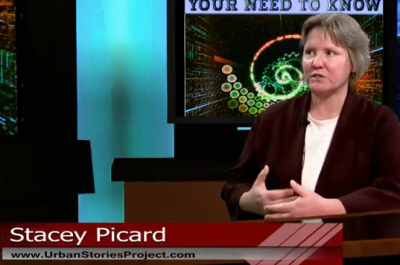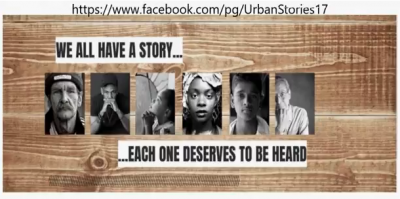The Urban Stories Project with Stacey Picard – Your Need to Know
(Jan. 31, 2018) Catherine Read interviews Stacey Picard, founder and director of The Urban Stories Project. The genesis of this organization focused on storytelling began five years ago when Stacey relocated to Northern Virginia from Cleveland, Ohio, and began volunteering. Tutoring first graders in math at the local elementary school during the week and serving lunch on weekends through SOME got her thinking about what happens to six year olds that some of them end up homeless. “Nobody wakes up and says, I think I’ll be homeless and stay under a bridge and this is the path I’ll take,” says Stacey.
A friend suggested she look into the work being done by Theatre Lab in Washington, DC. She cold called Deb Gottesman and got involved in their Life Stories Program. This program works with marginalized communities – AIDS patients, wounded warriors and homeless women in addiction – to create artistic pieces from their life stories that can be performed or made into a film. Involvement in the Life Stories Program brought her to N Street Village where she met Tom Workman who had been doing this type of storytelling with the women there for a decade.

She is currently working with Shout Mouse Press, a writing program and independent publisher founded by Kathy Crutcher. This opens up the possibility of creating enduring works of storytelling by collecting and publishing collections of stories. Stacey has been working with Friends of Guest House, a re-entry program for formerly incarcerated women, to help the women to tell their stories in ways that help them in their efforts to rejoin their families and communities. The women have to face potential employers with an explanation of how they made a poor decision and ended up with a felony record. They are also asked to speak in front of groups to tell their stories and in front of legislative committees who are considering policies that impact them and women like them. Stacey hopes to collect and publish a book based on the experiences of the women who have come through the Friends of Guest House program.
Stacey talks about the tribalism we are currently experiencing in this country and how technology and social media creates bubbles that isolate us into closed networks of like minded individuals. She observes that this leads us to stop seeing the humanity in other people. Storytelling is way to bring people together in a more genuine and authentic way. Helping people to tell their stories is not about agendas or creating spin. It’s about creating a safe space for someone to share their story, to trust themselves to access their own story and to feel “This matters. I matter. I own this and it deserves to be told.” Too often, the stories of marginalized people have been drown out. She often asks her students to consider: “What would the world be like if you didn’t exist.”
It’s also important for organizations to be able to tell their stories. Most non-profits and direct service agencies don’t have a line item in their budget for the professional development related to telling compelling stories about their mission. The clients they serve often don’t have the support and assistance to tell their stories on behalf of the organizations that changed their lives. And the staff who work in non-profit organizations are not necessarily equipped as storytellers either, creating missed opportunities to genuinely connect with clients, volunteers, collaborating partners, donors and the media. Stacey believes that Board and Staff Retreats are an excellent forum for introducing these concepts and she hopes to do more organizational work through The Urban Stories Project.
To learn more about The Urban Stories Project, you can follow them on Facebook and also on Twitter @UrbanStories17
